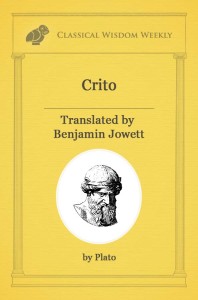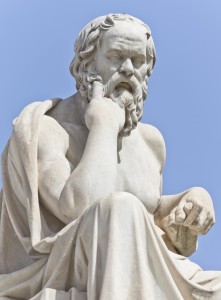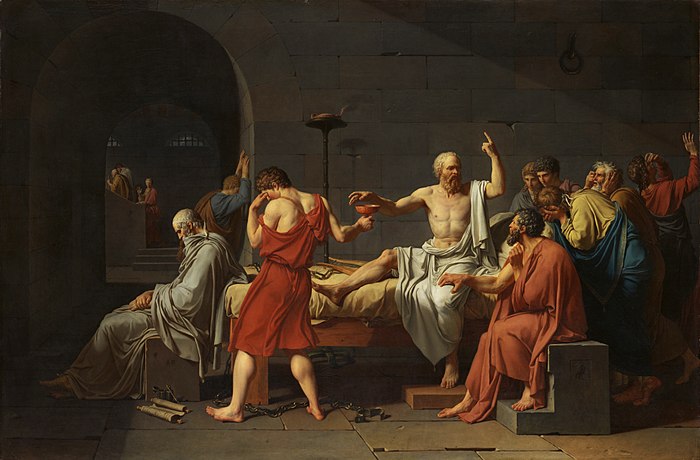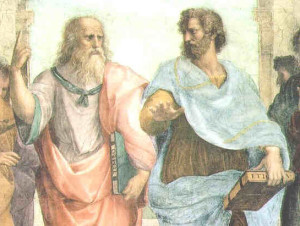by Anya Leonard
Somewhere between the words of Socrates and the thoughts of Plato lies the profound question of what is ‘Just’. Is it defined by laws and men or is it something separate, something ideal? When one is wrongfully imprisoned, for example, is it okay to escape, to break the “law” as it is written? This was the quandary in which Socrates found himself when facing an unfair death sentence.
 Of course, we can’t be sure which ideas actually belong to Socrates or to Plato. We only know that Crito, the second defense of Socrates, was written after the events took place. Even if Socrates did utter the words contained therein, it was a secondhand account at best. Chronologically though, it follows Socrates’ trial as seen in the Apology and slots in before his final death in Phaedo.
Of course, we can’t be sure which ideas actually belong to Socrates or to Plato. We only know that Crito, the second defense of Socrates, was written after the events took place. Even if Socrates did utter the words contained therein, it was a secondhand account at best. Chronologically though, it follows Socrates’ trial as seen in the Apology and slots in before his final death in Phaedo.Crito is actually the shortest of these three dialogues, but that doesn’t mean it’s the easiest to understand.
In it, Plato attempts to find justice in an unjust action. He wants to reconcile the injustice of his beloved friend’s execution with the respect that he has for the city and its laws. Certainly that is no simple feat, and one that some might say Plato did not entirely accomplish.
To understand this dialogue, one first must distinguish between the lower case and upper case words – laws vs. Laws, respectively. The latter represents something much grander than the collective ideas of men or the wisdom of a lawmaker. The Law is an ideal, a form, an entity – personified and perfect. And it’s Plato’s way out… a method for Socrates to remain good by following what is Just in the concept of the Laws, rather than obeying the evil of his unjust accusers who unethically utilize mere laws to kill him.
We begin the dialogue with Socrates in his cell, his imminent death casting a long shadow on the proceedings. His friend, Crito, has found him asleep and, impressed by his quiet slumber, does not want to wake him up to face his unfortunate reality. When finally Socrates comes to, Crito implores him to escape, employing, at times, astute logic to make his case.
He begins, perhaps, with a selfish point. Should Socrates allow himself to be killed, others will think his friends were not loose enough with their purses to rescue him. Crito makes clear that Socrates need not worry about his friends’ welfare or wallets. The provocative philosopher has sufficient benefactors to ensure his escape.
Crito’s second argument addresses the injustice of those who accused and sentenced him. By fulfilling their decision, Socrates is acting unjustly. By refusing to escape, he treats himself as his enemies treat him. This, says Crito, is morally wrong.
Lastly, Crito pleads for Socrates to think of his children, who will become orphans if he dies.
 He beseeches: “You appear to me to betray your own sons, who, when it is in your power to rear and educate them, you will abandon, and, so far as you are concerned, they will meet with such a fate as chance brings them, and as is probably, they will meet with such things as orphans are wont to experience in a state of orphanage”.
He beseeches: “You appear to me to betray your own sons, who, when it is in your power to rear and educate them, you will abandon, and, so far as you are concerned, they will meet with such a fate as chance brings them, and as is probably, they will meet with such things as orphans are wont to experience in a state of orphanage”.As a philosopher, it is Socrates’ aim it to reveal ignorance and inspire knowledge. Would he deny his own progeny his lessons?
Socrates, in turn, counters these arguments with his own. He attacks Crito’s concern for public approval, responding that the only opinions that matter, are of those with knowledge. In a swift rebuttal, he states: “what we ought to consider is not so much what people in general will say about us but how we stand with the expert in right and wrong, the one authority, who represents the actual truth.”
The matter at hand is not what people will think of Socrates. The real question is: is it Just to escape? Even if his punishment is unjust, he should still not act unrighteously. Here Socrates combats the idea of an ‘eye for an eye’, making the point that it is never right to do an injustice, even if you suffered an injury first. Therefore, he won’t leave his prison if the departure is proved to be unrighteous.
Crito concedes this point… but it still doesn’t address whether escape is Just. To answer this riddle, Socrates conjures the Laws, which confront and question the philosopher.
The Laws take the stance that escape is unjust, for disobeying the rules would, in effect, destroy the Laws and what they stand for. The State is held together by the Laws, and if the latter were to fall into disarray, the former would collapse as well. Therefore, Socrates’ illegal departure would be an affront the city-state that reared him. He argues allegiance to the State is more important than one’s well being or ties to their family…
Finally Socrates concludes that by living in Athens, he has agreed to her Laws. Not only that, he reared his children in the famous city-state and stayed there his whole, long, 70 years of his life. If he didn’t agree with the Laws, he could have left at any time, but chose not to.
The fact that the Laws are personified in Crito is important for our understanding of the “social compact” as viewed by Socrates. This is not Rousseau’s famous social contract, though it does at first appear that way. In the 18th century concept, the state or sovereign is a direct consequence of the people’s general will. Therefore, the social contract is an agreement between citizens to live together under the same laws. For Plato, however, this agreement is not made between citizens. It’s made between the individual citizen and the Laws – an entity in and of itself.
For Plato and for Socrates, the Laws are more like the ‘forms’ – an abstract idea that represents the fundamental essence of a thing. A chair, as we know it, is not just the thing we sit on, that you may be sitting on right now. It is also an idea of something that we sit on. Therefore, we can all look at a chair and say, “Yes, that is chair,” having in our minds a form of what a chair is.
In this way the Laws are something greater, purer than laws. The Laws are always Just, according to Socrates, but a law can be unjustly used.
This is how Plato tries to reconcile unjust actions with the innate Justice of the Laws. By acquiescing to the injustice, Socrates upheld the Laws and Justice and therefore, the State built upon them. Failure to do so would have destroyed all the ideals, truths and forms he held dear. This is why Socrates had to die.
–
Socrates Justice – Law and Disorder – Classical Wisdom Weekly was written by Anya Leonard











5 comments
I wonder what Socrates meant by Laws of the State? Indeed, is there such thing as a State? If we consider the matter Socratically the State, which is by nature possessing perfection, would require no governing body. With this problem in mind how can something like a State exist without a governing body? Likewise if there is no such Idea as the State do we not also loose what we consider Laws? Consider if he or anyone else should abide by Laws then all revolutions-even overthrowing a tyrant- would always be unjust.
I believe that Socrates’ deeper meaning is to reveal that the Law plays a vital role in a community. The prosperity of a community lies on the fact that without laws there can be neither a state nor a community. The democratic state was made by people’s deeper need to be organised as a community. And that community in order to have freedom, autonomy and self-sufficiency must have laws. I think that these values Socrates tried to defend. These values constitute a democratic state.
The more things change, the more they stay the same. The greater schema of society and the state will have us reduce our own self-worth to lesser importance and is instilled in us from birth. When faced with tyrannical forces, Socrates seems to had fallen to them in the name of a “greater good” that no longer existed. When Socrates was clinging to his misplaced noble intent, I have every confidence that the tyrants who sentenced him were quite amused. Basically, he should have centered on saving his own butt from unjust tyrannical forces and went off to live out his life elsewhere. It serves as a clear demonstration of the kind of powerful mind control that exists to this day.
pls can someone expiate if Plato is in support of the law being just, standing by the law means a lot to a person but not to the society, Socrates u are wonderfully and beautifully made. l love the story without me meeting you, I love ur personality and a good friend crito well done.
Oh, really?
Trackbacks
Our apologies, you must be logged in to post a comment.